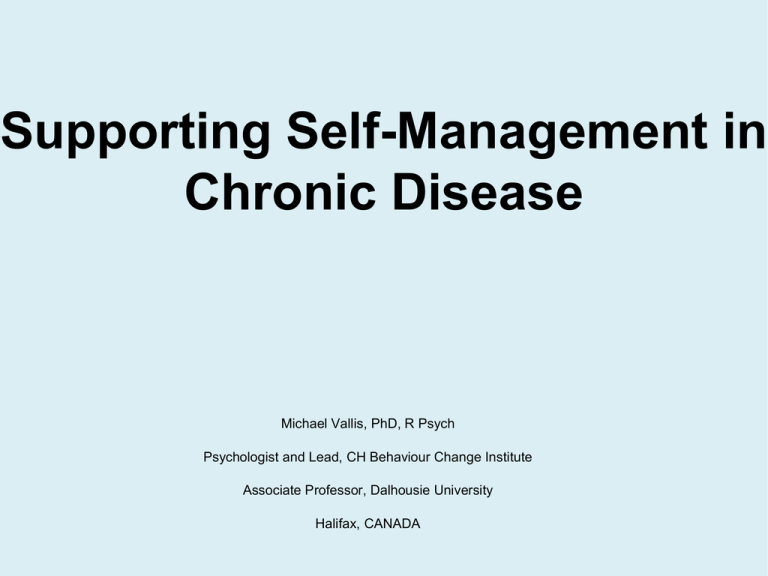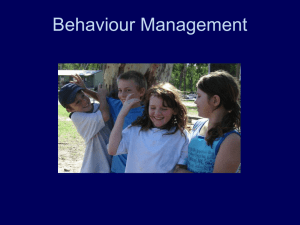t. michael vallis
advertisement

Supporting Self-Management in Chronic Disease Michael Vallis, PhD, R Psych Psychologist and Lead, CH Behaviour Change Institute Associate Professor, Dalhousie University Halifax, CANADA What, Me Judgmental? 2 What is the Standard of Care? • Dominant models of behaviour in health care • After giving rounds to dialysis/transplant team I was cornered by several staff • “You work in the diabetes centre, right? We need you to take a message to the staff” • • You don’t talk enough about complications Our patients say: “if I knew my life would be this bad I never would have let my diabetes stay out of control” • After giving a talk on behaviour change a family physician said • “The problem is we just don’t scare our patients enough. If we put the fear of god into them they would do what we say” DAWN2 % of people with diabetes and health care professionals reporting their health care team/they engage in each behavior most of the time or always N = 4,785 N = 8,596 25 Effective Self Management Interventions Establishing Readiness: Supporting Reduce Change-Based How to Assess Behaviour Risk of Relationships How to Enhance Change Relapse Outcomes are dependent on how good you are Interpersonal Dynamics • Fundamental change in the relationship between the individual and the HCP • • From • Expert clinician with uninformed helpseeker • • “Let me tell you what you need to do” “Let me tell you what you need to know” To • We both have a role to play • “I understand that you will make your own decisions and I respect that. Can we have a conversation about your health” Interpersonal Dynamics •What do patients want? •To minimize the impact of diabetes in their life •This often means avoiding the tasks •What do providers want? •To get the recommended glucose (A1c) and bp control •This means using lifestyle, medication and insulin Interpersonal Dynamics Therapeutic Alliance More Recipe for Disaster than Match Made in Heaven Interpersonal Dynamics • • • • Is the behaviour (or lack of it) a problem for you? Does the behaviour (or lack of it) cause you any distress? Are you interested in changing your behaviour? Are you ready to do something to change your behaviour now? Getting to the Behaviour Readiness Assessment Not Ready Understanding the behaviour •Personal meaning •Seriousness, personal responsibility, controllability, optimism Ready Go Right to Behaviour Modification Ambivalent Expanding on readiness •Personal/meaningful reasons to change •Willingness to work hard connect to principles •Delay of gratification Decisional Balance Self-Efficacy Barriers/Temptations Especially social, cultural and environmental • • It is not Psychotherapy Your role is best delivered in the following manner: • • • • Identify and label Educate Recommend Support Assess and address the 4 Ss Self-image Explore if the behaviour is internally of externally motivated Self-efficacy A person’s confidence to perform a specific behaviour in a specific context for a specific time period and in the face of specific barriers Social Support Are there external factors that help sustain the behaviour? Stress Identify emotional issues and search for opportunities to replace the function of unhealthy behaviour Identify and encourage stress management Link stress management to adherence, participation THAT’S ALL: THANK YOU! tvallis@dal.ca www.behaviourchangeinstitute.ca www.improvingdiabetescare.com





